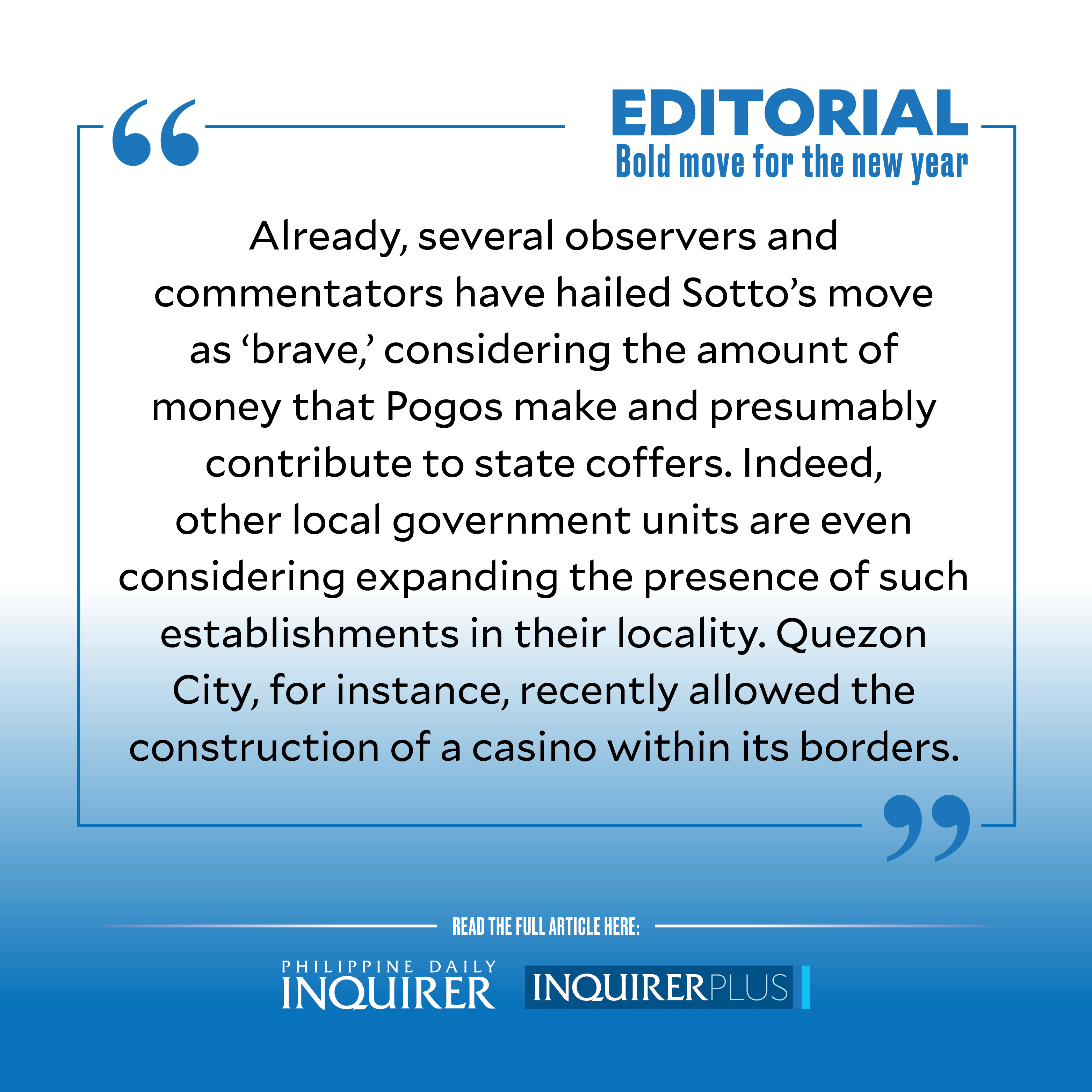Bold move for the new year

A piece of good news for the new year is the declaration made by Pasig City Mayor Vico Sotto that, following the passage of a local ordinance, all online and offshore gaming operations in the city have been banned.
Sotto pointed out that gambling “undermines the social, moral, and economic growth” of Pasig. City Ordinance No. 55, authored by Councilor Simon Tantoco, prohibits the issuance of permits to companies conducting e-games, “e-sabong,” e-bingo, online poker and casinos, computer gaming stations, and Philippine offshore gaming operators (Pogos). Also prohibited are operations of service providers giving technical support to online gambling, including gaming agents and other businesses related to Pogos.
Already, several observers and commentators have hailed Sotto’s move as “brave,” considering the amount of money that Pogos make and presumably contribute to state coffers. Indeed, other local government units are even considering expanding the presence of such establishments in their locality. Quezon City, for instance, recently allowed the construction of a casino within its borders.
But in Sotto’s view, the loss of income from taxes paid by gaming and gambling operations is no great loss for Pasig. “Even before this ordinance,” Sotto said during the flag-raising ceremony last Dec. 27, “the two remaining Pogos operating in Pasig have closed shop. In truth, they didn’t have a permit, they just started operating,” adding that with the new gambling regulation, no individual or company would be allowed to set up gambling operations in the city.
The young mayor explained that the new ordinance was passed to address the ill effects of online gaming on the city and its residents. Sotto cited an incident involving a 22-year-old mother from Pasig who reportedly “pawned” her eight-month-old daughter to pay off the debt she incurred while playing e-sabong, or online cockfighting.
“Have you seen anyone who entered online gambling and ended up improving their lives?” Sotto asked. “Temporarily, yes, but overall, you can check. They all lost money and many got addicted to gambling.”
He also confessed to being personally offended by reports of alleged offers of bribes during the permit renewal season. “For the longest time, these e-games and e-bingo have been a symbol of corruption in our city,” Sotto added, noting that some councilors, either former or incumbent, use his name, saying the bribes would guarantee the grant of a permit. “We heard that they have a budget every year for our officials. We do not want that,” he declared.
The Sotto administration has allayed fears of a sudden loss of income for Pasig with the passage and enforcement of the new ordinance. The city government estimated last year that the city would lose only P3 million in income. According to the Commission on Audit, Pasig City is the fourth richest city in the country, with assets totaling P51.18 billion, behind Quezon City, Makati, and Manila.
Still, it isn’t easy turning one’s back on the “riches” offered by online and offshore gaming operations, this despite reports of such firms failing to pay the right taxes, if not skipping payments altogether.
In its 2020 Annual Survey of Philippine Business and Industry, the Philippine Statistics Authority (PSA) said that the gambling industry was the top-paying employer in the country’s arts, entertainment, and recreation sector. The gambling industry’s compensation outmatched that of the entire sector, the PSA found, with workers earning an average of P465,000 in salaries and benefits, compared with those employed in arts, entertainment, cultural activities, and sports, who earned on average only P314,000 in 2020.
But the benefits gained from different forms of gambling and gaming are offset by problems, both personal and social, that they spawn.
Last year, some 30 cockfighters went missing from cockpits where they were either operators or gamblers, and till today their whereabouts remain a mystery.
Most recently, five Laguna police officials allegedly involved in the kidnapping of an e-sabong executive were dismissed from the Philippine National Police, though only three now face criminal charges of kidnapping and robbery. At the same time, there have been complaints of kidnapping of gamblers from China who owed huge debts to casino financiers, as well as of Pogo workers fighting among themselves in public, and causing public disturbances.
On the whole, then, while some may view Mayor Sotto’s move as quixotic, if not foolhardy, in the end he may be proven to have saved his city—and country—from the pernicious long-term effects of gambling and gaming.
















